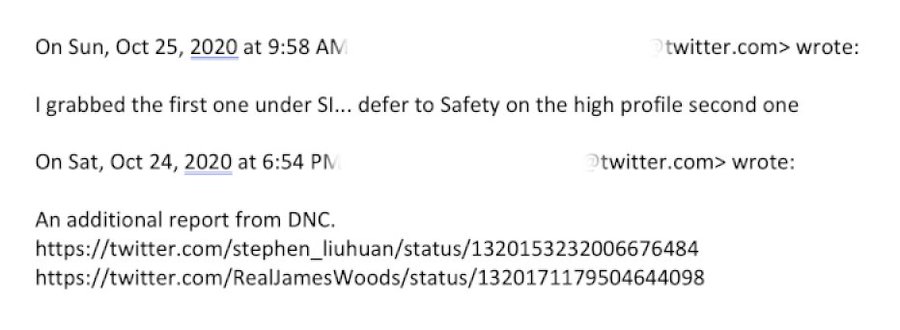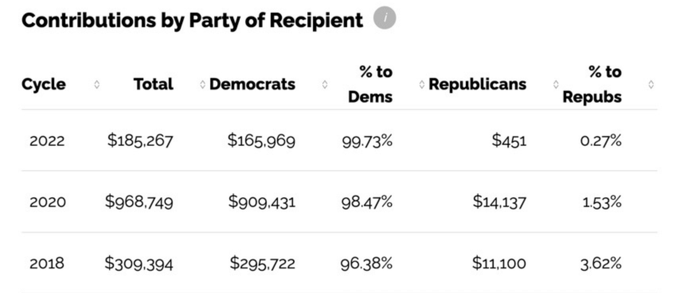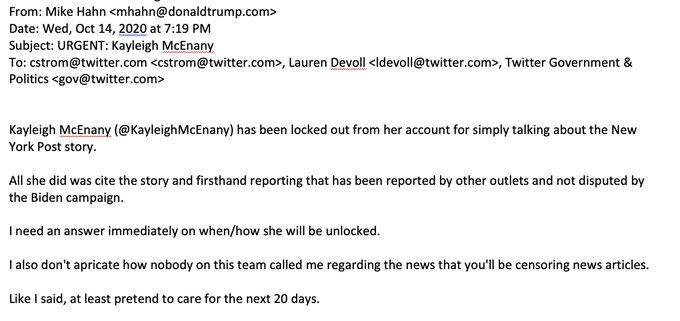By TeKāhu
Elon Musk has been opening hidden documentation on the previously Progressive-owned Twitter, and the fallout is increasing in impact and as a damning indictment on Left-wing censorship. Musk today announced that he would have the real story behind the Hunter Biden story suppression:

This expose details the shocking usage of Twitter to suppress reporting of a heated topic during the US election campaign and the wider issue of the relationship between Ukraine and President Biden.
It shows a clear obedience to Left wing ideology and the suppression of information that was of great importance for public discussion.
The following is from Matt Taibi:
1. Thread: THE TWITTER FILES
— Matt Taibbi (@mtaibbi) December 2, 2022
What you’re about to read is the first installment in a series, based upon thousands of internal documents obtained by sources at Twitter.
The “Twitter Files” tell an incredible story from inside one of the world’s largest and most influential social media platforms. It is a Frankensteinian tale of a human-built mechanism grown out the control of its designer.
Twitter in its conception was a brilliant tool for enabling instant mass communication, making a true real-time global conversation possible for the first time.
In an early conception, Twitter more than lived up to its mission statement, giving people “the power to create and share ideas and information instantly, without barriers.”
As time progressed, however, the company was slowly forced to add those barriers. Some of the first tools for controlling speech were designed to combat the likes of spam and financial fraudsters. Slowly, over time, Twitter staff and executives began to find more and more uses for these tools. Outsiders began petitioning the company to manipulate speech as well: first a little, then more often, then constantly. By 2020, requests from connected actors to delete tweets were routine. One executive would write to another: “More to review from the Biden team.” The reply would come back: “Handled.”

Celebrities and unknowns alike could be removed or reviewed at the behest of a political party:
Both parties had access to these tools. For instance, in 2020, requests from both the Trump White House and the Biden campaign were received and honored. However, this system wasn’t balanced. It was based on contacts. Because Twitter was and is overwhelmingly staffed by people of one political orientation, there were more channels, more ways to complain, open to the left (well, Democrats) than the right. opensecrets.org/orgs/twitter/s.
The resulting slant in content moderation decisions is visible in the documents you’re about to read. However, it’s also the assessment of multiple current and former high-level executives.
Okay, there was more throat-clearing about the process, but screw it, let’s jump forward
The Twitter Files, Part One: How and Why Twitter Blocked the Hunter Biden Laptop Story
On October 14, 2020, the New York Post published BIDEN SECRET EMAILS, an expose based on the contents of Hunter Biden’s abandoned laptop:
17. On October 14, 2020, the New York Post published BIDEN SECRET EMAILS, an expose based on the contents of Hunter Biden’s abandoned laptop: https://t.co/q4zaMw6aVV
— Matt Taibbi (@mtaibbi) December 3, 2022
Twitter took extraordinary steps to suppress the story, removing links and posting warnings that it may be “unsafe.” They even blocked its transmission via direct message, a tool hitherto reserved for extreme cases, e.g. child pornography. White House spokeswoman Kaleigh McEnany was locked out of her account for tweeting about the story, prompting a furious letter from Trump campaign staffer Mike Hahn, who seethed: “At least pretend to care for the next 20 days.”
This led public policy executive Caroline Strom to send out a polite WTF query. Several employees noted that there was tension between the comms/policy teams, who had little/less control over moderation, and the safety/trust teams:
Strom’s note returned the answer that the laptop story had been removed for violation of the company’s “hacked materials” policy: web.archive.org/web/2019071714
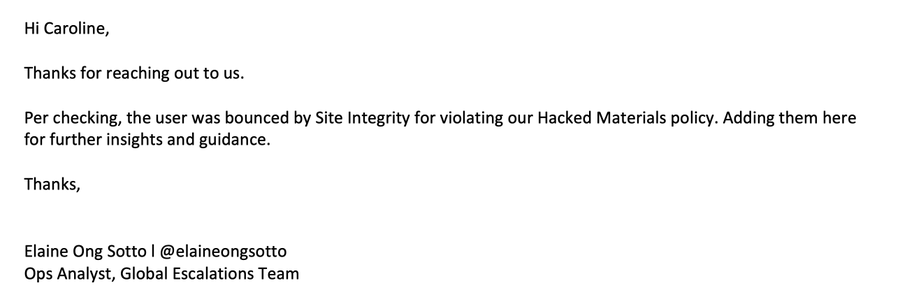
Although several sources recalled hearing about a “general” warning from federal law enforcement that summer about possible foreign hacks, there’s no evidence – that I’ve seen – of any government involvement in the laptop story. In fact, that might have been the problem. The decision was made at the highest levels of the company, but without the knowledge of CEO Jack Dorsey, with former head of legal, policy and trust Vijaya Gadde playing a key role.
“They just freelanced it,” is how one former employee characterized the decision. “Hacking was the excuse, but within a few hours, pretty much everyone realized that wasn’t going to hold. But no one had the guts to reverse it.”
You can see the confusion in the following lengthy exchange, which ends up including Gadde and former Trust and safety chief Yoel Roth. Comms official Trenton Kennedy writes, “I’m struggling to understand the policy basis for marking this as unsafe”:
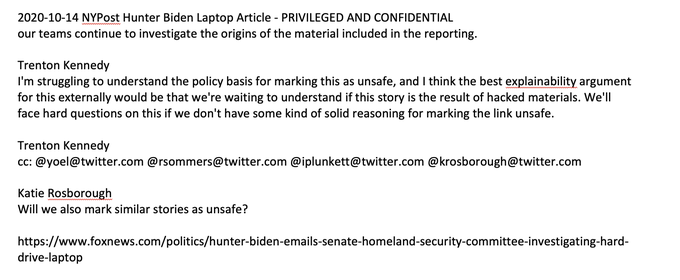
By this point “everyone knew this was fucked,” said one former employee, but the response was essentially to err on the side of… continuing to err.
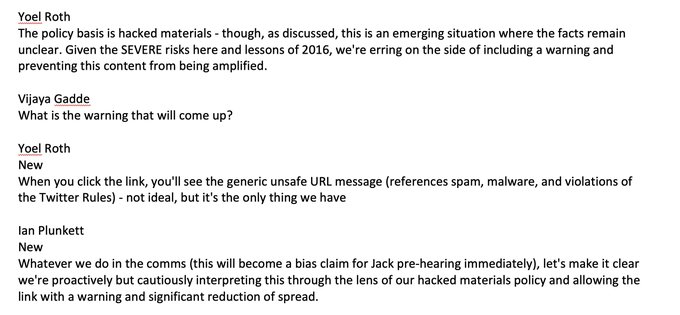
Former VP of Global Comms Brandon Borrman asks, “Can we truthfully claim that this is part of the policy?”

To which former Deputy General Counsel Jim Baker again seems to advise staying the non-course, because “caution is warranted”:

A fundamental problem with tech companies and content moderation: many people in charge of speech know/care little about speech, and have to be told the basics by outsiders. To wit: In one humorous exchange on day 1, Democratic congressman Ro Khanna reaches out to Gadde to gently suggest she hop on the phone to talk about the “backlash re speech.” Khanna was the only Democratic official I could find in the files who expressed concern.

Gadde replies quickly, immediately diving into the weeds of Twitter policy, unaware Khanna is more worried about the Bill of Rights:
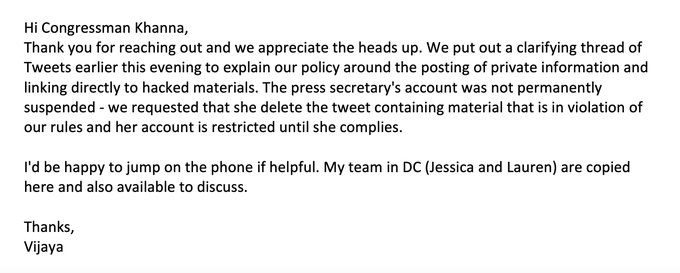
Khanna tries to reroute the conversation to the First Amendment, mention of which is generally hard to find in the files:
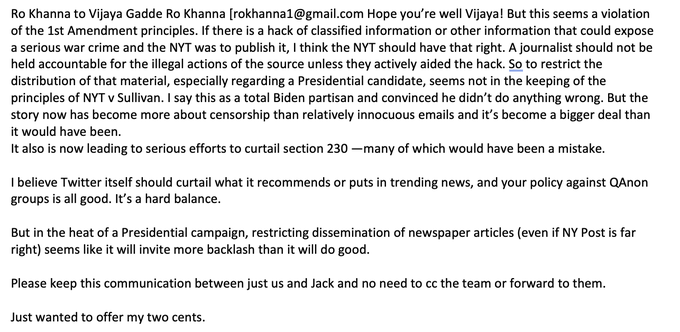
Within a day, head of Public Policy Lauren Culbertson receives a ghastly letter/report from Carl Szabo of the research firm NetChoice, which had already polled 12 members of congress – 9 Rs and 3 Democrats, from “the House Judiciary Committee to Rep. Judy Chu’s office.”
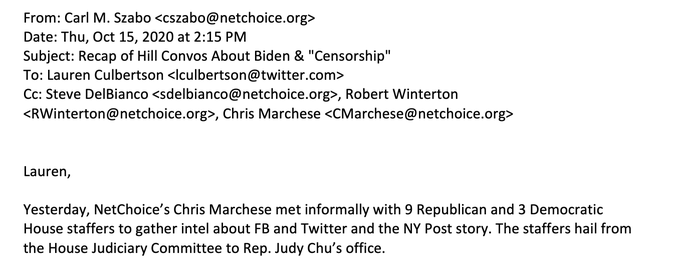
NetChoice lets Twitter know a “blood bath” awaits in upcoming Hill hearings, with members saying it’s a “tipping point,” complaining tech has “grown so big that they can’t even regulate themselves, so government may need to intervene.”

Szabo reports to Twitter that some Hill figures are characterizing the laptop story as “tech’s Access Hollywood moment”:



